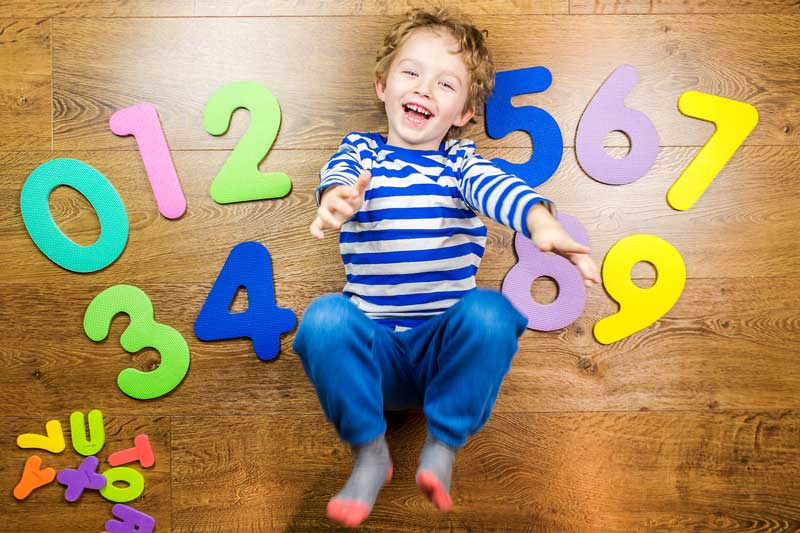Mathematics in Everyday Conversation and Play

Why Should We Care About Math?
“I’m a big sister, but I’m also a little sister – Can I sit at the big kid table and wash dishes?” – Ari
“I run faster than my dad, but I think I might be slower than a tiger. But I might be the same as a baby tiger? I am really really really good at running.” – Leya
“Do you think I can fit 100 jellybeans in my mouth? 10 was so easy to do!” – Milo
Embedded within these comments are intuitive and sophisticated mathematical ideas that help young children make sense and meaning of their world and their relationships.
- Ari is developing a sense of identity and the responsibilities that come with being a member of a family with multiple siblings during a dinner party. She is using ordinal reasoning to help her understand.
- Leya is using comparative statements about speed, a quantifiable metric, to get a sense of her abilities and potential as an athlete.
- Milo is proposing to use his body as a measurement tool, which humans have been doing for longer than jellybeans have been around (the record is 1905 jellybeans in case you were wondering – I was, so I googled it).
Studies suggest (Duncan et al., 2007; Romano et al., 2010) that the strongest predictors of school achievement beyond third grade are pre-school mathematics, reading, and attention skills. However, mathematics is the strongest of these predictors. In fact, children’s early mathematics skills are the strongest predictor of school success regardless of child gender, family income, early vocabulary skills or socio-emotional behaviors. Studies such as these suggest that mathematical ideas and concepts are fundamental features of cognition, given their positive impact on other important academic skills.
You can train your brain to see children’s mathematical ideas in everyday events and conversations!
Think about the ways that you use mathematics to accomplish everyday tasks. You help children figure out how to share a package of cookies fairly and you manage a budget while grocery shopping. Now see if you can use this same lens to see the mathematics hidden in the conversations and behaviors of young children.
If you suspect a mathematical event is occurring, ask yourself:

- What are the mathematical ideas of relevance?
- Is the child aware they are asking a mathematical question? Or alternatively, is the child aware that mathematics can help them solve their problem?
- How can you frame the question or potential solution as a mathematical one?
So About Those Jellybeans...
Consider Milo and his question about whether he can fit 100 jellybeans into his mouth:

- Milo is asking a question about measurement – specifically, volume.
- As a first step, you might ask Milo to count out 100 jellybeans or some other object that is roughly the same size as a jellybean. This way, you can see how Milo conceptualizes “100” and how much space it might occupy.
- Once you have a sense of what Milo means when he says “100,” invite him (and interested friends) to figure out how big a vessel needs to be in order to accommodate 100 jellybeans.
Mathematical ideas are another way young children make meaning in what they do and what they encounter. If you listen carefully, you can help children make their mathematical ideas within conversation and play visible. And in case you were wondering, Milo’s teacher (me!) asked him and two friends to count out 100 jellybeans so we could see what “100” looked like. In the end, he and his friends decided to place 1 jellybean on each number of a 100 chart (one-to-one correspondence practice!) and decided that sharing 10 jellybeans with 10 friends was a better use of a tasty snack (equipartitioning!).
Reminder of Math Resources
As a reminder, the VKRP Resources page on the VKRP website includes multiple free and accessible math resources for your classroom or for parents to try at home. Children are genuinely curious about the world around them, and a lot of that curiosity involves mathematical ideas and concepts. Together, educators and family members can play a huge role in harnessing and encouraging that creativity as these young minds continue to grow.
More questions? VKRP provides support via the online chat feature when you are in the system, via email vkrp@virginia.edu, and via toll free 866-301-8278 ext. 1

